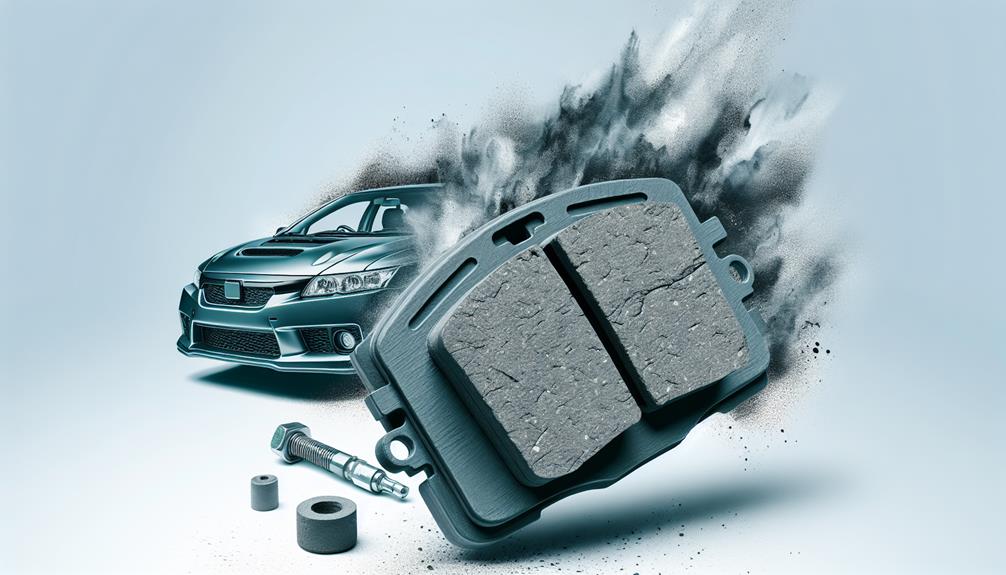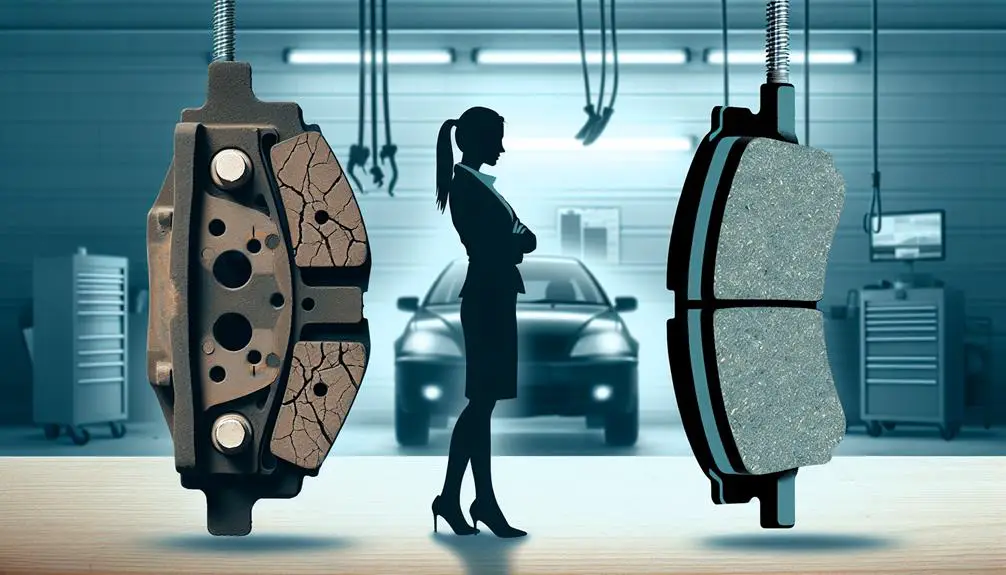It depends.
Let's face it, you've probably spent more time choosing your morning coffee than pondering whether OEM brake pads are worth their salt. But here's the kicker: the safety and performance of your vehicle might just hinge on that decision. OEM brake pads come with the promise of compatibility and reliability, straight from the vehicle's manufacturer.
Yet, the question lingers—do they really outshine their aftermarket counterparts in the long run, or are you just paying for the brand? The answer isn't as straightforward as you might think, and apprehending the intricacies could greatly impact your vehicle's braking performance and your wallet.
Let's delve into the facts, shall we?
Understanding OEM Brake Pads

To fully grasp the concept, it's important to understand that OEM brake pads are designed and manufactured by the original equipment manufacturer of your vehicle. This means they're the same pads that were installed on your car when it rolled off the assembly line. They're not just any brake pads; they're made specifically for your vehicle, taking into account its weight, performance, and braking system design. You're getting a part that's been meticulously engineered to work seamlessly with your car's braking system.
When you're considering replacing your brake pads, you might wonder why the type matters. After all, a brake pad's job is straightforward: to stop your car. However, not all brake pads are created equal. The materials used in OEM brake pads are selected to offer a balance between durability, noise control, and performance for your specific vehicle. This tailored approach ensures that you're getting a product that's optimized for your car's needs.
Additionally, as they're made by the same manufacturer, OEM brake pads typically offer a perfect fit. This is key to preventing issues like brake noise or premature wear. Aftermarket pads might come close, but even a slight difference in design can lead to complications down the line.
Benefits of OEM Brake Pads
Appreciating the unique role of OEM brake pads in your vehicle's design sets the stage for valuing the benefits they offer, including improved safety and performance. When you're driving through the busy city streets or cruising down the highway, knowing you've got OEM brake pads working for you can offer unparalleled peace of mind. Let's explore why sticking with OEM brake pads might just be the best decision for your ride.
- Optimized Compatibility: OEM brake pads are designed specifically for your vehicle model, ensuring a perfect fit and optimal performance. You won't have to worry about the pads being too big or too small, which can be a common issue with aftermarket options. This tailored fit helps in maintaining your vehicle's braking efficiency and reliability.
- Quality Assurance: Manufacturers put OEM brake pads through rigorous testing to meet strict safety and durability standards. This means you're less likely to encounter premature wear or failure, which can save you money and keep you safer on the road.
- Reduced Noise and Vibration: Thanks to their precise engineering, OEM brake pads generally produce less noise and vibration compared to their aftermarket counterparts. This contributes to a more comfortable and quieter driving experience.
- Warranty Protection: Using OEM brake pads can help in maintaining your vehicle's warranty. Some manufacturers may void the warranty if aftermarket parts cause damage. By sticking with OEM, you're playing it safe and keeping your warranty intact.
Choosing OEM brake pads ensures that you're getting a product that's tailor-made for your vehicle, offering you peace of mind with every stop you make.
Drawbacks of OEM Brake Pads

While OEM brake pads offer numerous benefits, they come with certain drawbacks that you should take into account. Essential and foremost, you'll often find that OEM brake pads are more expensive than their aftermarket counterparts. This higher cost doesn't always equate to superior performance or longevity. You're basically paying a premium for the brand and the assurance that the pads are an exact match for your vehicle.
Additionally, the selection of OEM brake pads can be quite limited. Manufacturers typically offer one type of pad per vehicle model, which means you're stuck with whatever material and performance level the OEM deems appropriate. If you're someone who prefers to tailor the braking characteristics of your vehicle to your driving style or needs, this can be a significant limitation. For example, if you're interested in a brake pad that offers less brake dust or one that's tailored for high-performance driving, you mightn't find an OEM option that meets your requirements.
Another point to take into account is availability. Depending on your vehicle's make, model, and year, OEM brake pads may not always be readily available. This can be particularly challenging if you need a replacement quickly. You might've to wait for parts to be ordered and shipped, which isn't ideal if your vehicle is your primary mode of transportation.
Comparing Aftermarket Alternatives
When evaluating brake pads, it's important to contemplate aftermarket alternatives, which often provide comparable performance at a lower cost. Aftermarket companies specialize in brake components, often focusing on specific areas like performance, longevity, or low dust formulations. This specialization can lead to products that, in some aspects, surpass the capabilities of OEM pads.
Here's why you might consider aftermarket brake pads:
- Range of Options: Aftermarket manufacturers offer a wide range of products tailored to different driving conditions and preferences. Whether you're looking for high-performance pads for spirited driving or ceramic pads for quiet and clean operation, there's likely an aftermarket option that fits your needs.
- Innovative Technologies: Some aftermarket brands invest heavily in research and development, introducing new materials and technologies that can offer better performance, longer wear, or both. This innovation often comes without the premium price tag associated with OEM parts.
- Availability: Unlike OEM parts that you might've to source from a dealership, aftermarket brake pads are widely available from various retailers, both online and in physical stores. This accessibility can make it easier for you to find the right pads at the right time.
- Feedback and Reviews: With a vast user base, aftermarket products often have extensive reviews and feedback available online. This information can be invaluable in helping you make an informed decision based on the experiences of other users with similar vehicles and driving conditions.
Choosing the right brake pads involves weighing factors like performance, cost, and availability. Aftermarket alternatives can offer a compelling choice for many drivers, blending quality and value in a way that OEM parts sometimes can't match.
Cost Analysis

Delving into the cost analysis, it's important you understand that the initial price of OEM brake pads often exceeds that of aftermarket alternatives. You're faced with a decision that hinges not just on the price tag at the point of sale but furthermore on long-term financial implications. Let's break it down.
OEM brake pads are designed specifically for your vehicle by the manufacturer. This tailored design means they're likely to offer better performance and a longer lifespan compared to many aftermarket options. While you're paying more upfront, you're additionally getting a product that's expected to last longer, potentially offering better value over time.
However, it's not just about the purchase price and longevity. Consider the warranty coverage that comes with OEM parts. Many manufacturers offer warranties that can provide peace of mind and potentially save you money if the brake pads fail prematurely. Aftermarket parts, while cheaper, often come with more limited warranties, which could lead to additional costs down the line if replacements are needed sooner than expected.
Also, think about the impact on your vehicle's resale value. Using OEM parts can help maintain your car's value better than aftermarket parts. This aspect is frequently overlooked but can be quite significant if you plan to sell or trade in your vehicle in the future.
Making the Right Choice
Given the considerations outlined above, you're now in a position to make an informed decision regarding whether OEM brake pads are worth the investment for your vehicle. Deciding on the right brake pads is important for both your car's performance and your safety. Here's how you can weigh your options:
- Evaluate Your Driving Needs: If you're often driving in heavy traffic or harsh conditions, OEM brake pads might be your best bet. They're designed specifically for your vehicle's make and model, offering best performance and durability.
- Consider Your Budget: While OEM parts are generally more expensive, they tend to last longer and perform better, which could save you money in the long run. However, if you're looking for a cost-effective solution in the short term, high-quality aftermarket brake pads might do the trick.
- Research and Reviews: Don't just take the manufacturer's word for it. Look up reviews from other drivers of your vehicle model. Their experiences can provide valuable insights into how the brake pads perform in real-world conditions.
- Professional Advice: It's always a good idea to consult with a trusted mechanic. They can offer personalized advice based on your vehicle's condition and your driving habits.
In the end, the choice between OEM and aftermarket brake pads boils down to finding the right balance between cost, quality, and your specific needs. By taking the time to assess these factors, you'll make you're making the best decision for your vehicle and your safety on the road.
Conclusion
Ultimately, whether OEM brake pads are worth it depends on your priorities. If you value peace of mind, exact fit, and manufacturer guarantees, then yes, they're a solid choice. They often offer a balance of longevity, performance, and noise reduction tailored to your vehicle.
However, if cost is a major concern, exploring aftermarket alternatives might be beneficial. They can offer comparable performance at a lower price point. Weigh your options carefully to make the right decision for your needs and budget.